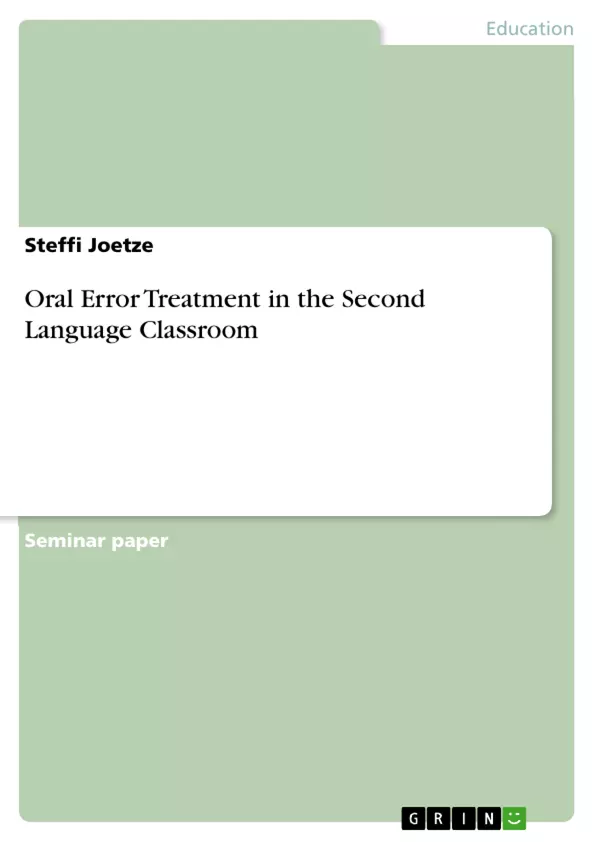“Should learner errors be corrected? If so, when should learner errors be corrected? Which learner errors should be corrected? Who should correct learner errors? And how should learner errors be corrected?” (Hendrickson 1978, p. 389). This series of questions, raised by Hendrickson, frame the diverse decisions a teacher has to make within only few seconds in his/her daily teaching according to a learner’s error.
To explore special parts of this extensive topic more precisely and to find out what role teacher and learner play exactly in the treatment of oral errors should be the aim of the following investigation.
First of all the theoretical concept of error and correction itself will be dealt with to make clear from which perspective the subject of oral error treatment in the L2 classroom will be considered. Then the paper will have a practical orientation to the L2 classroom: in this connection the focus will lie on answering one of the questions raised above namely “Should learner errors be corrected?”. With reference to this we try to find out on which factors the decision of correcting/not correcting students’ errors depends. Answering the question how learners’ errors should be corrected represents such a complex issue that it would be impossible to get a complete look at it in this research. Therefore recasts and elicitations, as special kinds of corrective feedback used in L2 classrooms, are considered in detail to get a deeper impact of possible ways students’ errors are treated in oral work. Simultaneously it should be found out if recasts/elicitations are effective examples of oral error treatment and whether there are differences in terms of the effectiveness according to the type of error that is made.
Inhaltsverzeichnis (Table of Contents)
- Introduction
- Definitions
- Error vs. Mistake
- Correction
- Reaction to Learners' Oral Errors
- Should Learner Errors Be Corrected?
- The Focus of the Lesson
- Further Influencing Factors
- Discussion: Chances and Risks of Correcting/ not Correcting Errors
- Recast and Elicitation - Two Types of Corrective Feedback
- Recast
- Elicitation
- Discussion: Two Effective Examples of Oral Error Treatment?
- Should Learner Errors Be Corrected?
- Conclusion
Zielsetzung und Themenschwerpunkte (Objectives and Key Themes)
This research aims to explore the role of teachers and learners in the treatment of oral errors in second language (L2) classrooms. It focuses on the theoretical concept of error and correction, examines the decision-making process behind error correction, and investigates the effectiveness of specific corrective feedback techniques, such as recasts and elicitations.
- The definition of "error" in the context of language learning
- The rationale behind error correction in L2 classrooms
- Factors influencing the decision to correct or not correct learner errors
- The effectiveness of specific corrective feedback techniques
- The role of both teachers and learners in the error correction process
Zusammenfassung der Kapitel (Chapter Summaries)
- Introduction: This chapter introduces the topic of oral error treatment in L2 classrooms and outlines the research questions that will be addressed. It highlights the importance of understanding error correction in the context of second language acquisition.
- Definitions: This chapter defines the terms "error" and "correction" within the context of L2 learning. It explores different theoretical perspectives on these concepts and discusses the significance of distinguishing between errors and mistakes.
- Reaction to Learners' Oral Errors: This chapter addresses the central question of whether and how learners' oral errors should be corrected. It discusses the various factors that influence this decision, including the focus of the lesson, student characteristics, and the nature of the error itself.
Schlüsselwörter (Keywords)
The key themes and concepts explored in this text include: error correction, oral error treatment, second language acquisition, corrective feedback, recasts, elicitations, learner errors, teacher feedback, L2 classrooms, and language competence.
Frequently Asked Questions
Should learner errors always be corrected?
The decision depends on factors like the focus of the lesson, the student's level, and whether the error hinders communication.
What is the difference between an error and a mistake?
An error usually indicates a lack of knowledge, while a mistake is a performance slip in something the learner already knows.
What is a "recast" in corrective feedback?
A recast is when a teacher reformulates a student's incorrect utterance into the correct form without directly pointing out the error.
What is "elicitation" in language teaching?
Elicitation involves techniques where the teacher prompts the student to self-correct or provide the correct form themselves.
Who should correct learner errors?
Correction can be done by the teacher, the learner themselves (self-correction), or by peers, depending on the classroom dynamic.
- Quote paper
- Steffi Joetze (Author), 2007, Oral Error Treatment in the Second Language Classroom, Munich, GRIN Verlag, https://www.grin.com/document/174060



